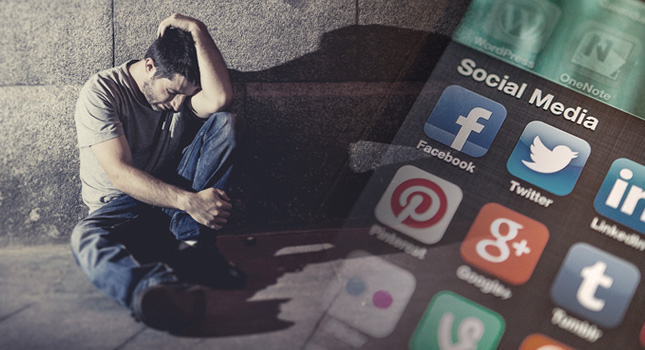Depression is a mental health disorder that affects people of all ages, races, and religions. According to the World Health Organization, depression is the leading cause of disability worldwide. And while there are many factors that can contribute to depression, it’s clear that the digital age has played a significant role in its increase. In this blog post, we will explore the relationship between social media and depression, and discuss some ways to get help if you or someone you know is struggling with mental health issues.
Contents
Defining Depression
Depression is more than just feeling sad or down for a few days. It’s a serious mental health disorder that can have a profound effect on every aspect of your life, from your relationships to your job performance. Symptoms of depression can include:
- Persistent feelings of sadness, anxiety, or emptiness
- Loss of interest in activities you once enjoyed
- Changes in appetite or weight
- Sleep problems
- Fatigue or decreased energy levels
- Feelings of worthlessness or guilt
- Difficulty concentrating
If you’re experiencing any of these symptoms, it’s important to seek professional help. Depression is treatable, and there are many resources available to those who need it.
Depression And Social Media
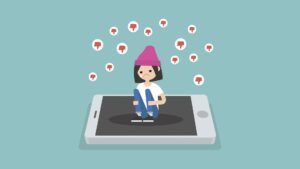
It’s no secret that social media can be a breeding ground for negativity. From the constant comparison to others’ “perfect” lives to the non-stop stream of bad news, it’s easy to see how social media can trigger or worsen depression symptoms. In fact, one study found that people who use social media more than two hours per day are twice as likely to experience depression and anxiety symptoms than those who use it less than 30 minutes per day.
It must also be noted that social media is not the only factor that can contribute to depression. If you’re already struggling with mental health issues, spending too much time on social media can exacerbate your symptoms. But if you’re not currently dealing with any mental health issues, social media alone is unlikely to cause depression.
But there’s no denying that social media plays a role in the mental health of its users. If you find yourself feeling down after scrolling through your feed, it might be time to take a break from social media. And if you’re struggling with depression or anxiety, there are many resources available to help you get the support you need.
Other Causes Of Depression
Depression is a complex mental health disorder, and there are many factors that can contribute to its development. Some other causes of depression include:
- Genetics: If you have a family history of depression, you’re more likely to experience it yourself.
- Brain chemistry: Depression is often caused by an imbalance of neurotransmitters in the brain.
- Life events: Traumatic or stressful life events, such as the death of a loved one or losing your job, can trigger depression.
- Medical conditions: Depression can be caused by certain medical conditions, such as thyroid problems or chronic pain.
- Substance abuse: Substance abuse is both a cause and symptom of depression. People who are struggling with depression may turn to drugs or alcohol as a way to cope with their symptoms, which can then lead to addiction.
It is very important to keep in mind that social media is not a root cause of depression. However, it can be a trigger or exacerbating factor for those who are already struggling with mental health issues. If you find yourself feeling down after spending time on social media, there are many other ways to stay connected with the people in your life, and you don’t need to rely on social media to do so.
Effects Of Social Media On Depression
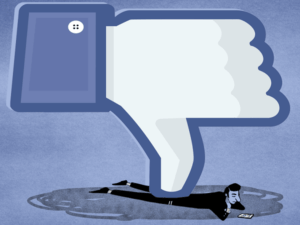
While social media can be a great way to stay connected with friends and family, it can also have a negative effect on your mental health. If you’re struggling with depression, here are a few ways that social media might be making it worse:
Isolating yourself
When you’re depressed, it’s easy to isolate yourself from the people and activities you once enjoyed. Social media can make this isolation worse by giving you a false sense of connection to the outside world. This behavior may manifest as excessive scrolling through your feed, compulsively checking notifications, or spending hours watching videos or reading articles.
Indulging in mindless spending
Social media is designed to be addictive, and that’s bad news for your wallet. If you find yourself mindlessly scrolling through your feed or making impulse purchases, it might be time to take a break from social media. In recent times, a lot of brands and agencies have also utilized social media marketing to their advantage. This strategy also tends to make people shop and spend more.
Dwelling on negative comments
It’s hard to avoid the haters when they’re just a click away. If you’re struggling with depression, negative comments can feel like a gut punch. And dwelling on them can make your symptoms worse. The anonymity of the internet can also make people feel like they can say anything without consequence. So if you’re struggling with depression, it might be time to take a break from social media.
Triggering your anxiety
For many people, social media is a triggering experience. If you find yourself feeling anxious after scrolling through your feed, it might be time to take a break. There are plenty of other things you can do to occupy your time, and there’s no need to put yourself in an anxious state.
Missing out on real life
Wherever you go, it is very easy to find people busy filming or recording instead of enjoying and living in the moment. According to a study done byEventbrite, 56% of millennials say they would rather experience something through social media than in person. If you find yourself missing out on real-life experiences because you’re too busy documenting them for social media, it might be time to put your phone down and enjoy the moment.
Comparing yourself to others
It’s human nature to compare ourselves to others, but social media takes this to a whole new level. With the constant stream of “perfect” lives and carefully curated images, it’s easy to fall into the trap of comparing yourself to others. This can lead to feelings of inadequacy, jealousy, and low self-esteem. Social media can give you a distorted view of reality, which can worsen depression symptoms.
Making impulsive decisions
Depression can cloud your judgment and lead to impulsive decision-making. This can arise from anything, such as buying things you can’t afford or making impulsive decisions about your relationships. If you find yourself making impulsive decisions, it might be time to take a break from social media.
It’s no secret that social media can be a breeding ground for negativity. From the constant comparison to others’ “perfect” lives to the non-stop stream of bad news, it’s easy to see how social media can trigger or worsen depression symptoms
Managing Depression Side Effects On Social Media
If you find that social media is making your depression symptoms worse, there are a few things you can do to make it more manageable. This can happen either by adopting self-care strategies, or taking help from a mental health professional.
Self Care Strategies
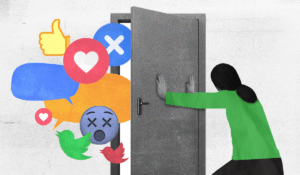
Self-care is the best care. Here are some things you can do to take care of yourself:
- Set time limits: If you find that social media is making your depression symptoms worse, try limiting your time on it. You can start by setting a timer for how long you want to spend on social media each day. Once you get used to spending less time on it, you can gradually reduce the amount of time you spend on it even further.
- Take breaks: If you’re feeling overwhelmed, anxious, or triggered, it’s okay to take a break from social media. This doesn’t mean permanently deleting your account, but rather taking a day or two (or even a week) off from social media to give yourself some time to recover.
- Focus on positive content: Make an effort to focus on positive content when you are on social media. This can be anything from following accounts that make you laugh to muting keywords that trigger your anxiety.
- Unfollow negative accounts: If you’re constantly comparing yourself to others on social media, try unfollowing accounts that make you feel bad about yourself. You don’t need that negativity in your life!
- Practice gratitude: As we already know, gratitude can help improve your mental state. So when you’re feeling down, try looking at social media as a way to practice gratitude. Instead of focusing on what others have that you don’t, focus on what you’re grateful for in your own life.
- Connect with friends and family: Social media can be a great way to connect with friends and family. But it’s important to make sure that you’re not using it as a replacement for in-person interactions. Also make sure that you are not only connecting with people who make you feel good, but also those who will be there for you when you’re going through tough times.
Adopting these practices can help make social media a more positive experience for you, and can also help lessen the negative impact it has on your mental health.
Professional Help
If you find that you’re struggling to stick to these self-care strategies, or if you find that social media is still making your depression symptoms worse, it might be time to seek professional help. A mental health professional can help you develop a more personalized plan to deal with your depression, and can also provide you with support and guidance.
Some of the most effective, practical, and recommended ways of professionals use to manage social media and depression are:
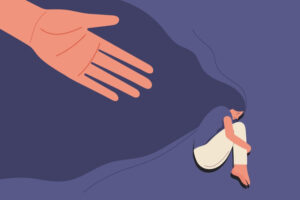
- Talk therapy: This is a type of therapy that can help you understand and manage your thoughts, emotions, and behaviors. It can also be used to help you develop healthy coping mechanisms. Some of the most popular types of talk therapy are Cognitive Behavioral Therapy (CBT), Dialectical Behavior Therapy (DBT), and Psychodynamic Therapy.
- Medication: In some cases, medication may be necessary to help manage depression symptoms. If you’re considering medication, it’s important to speak with a mental health professional to see if it’s right for you. Some common depression medications include: selective serotonin reuptake inhibitors (SSRIs), norepinephrine-dopamine reuptake inhibitors (NDRIs), and tricyclic antidepressants (TCAs).
- Hospitalization: In some cases, hospitalization may be necessary to help manage severe depression symptoms. This is usually only recommended if you are a danger to yourself or others, or if you are not able to take care of yourself.
- Support groups: There are many different types of support groups available, both in-person and online. These groups can provide you with social support, which is essential for managing depression. Depression can be a very isolating experience, but you don’t have to go through it alone.
No one deserves to suffer from depression in silence. If social media is making your depression worse, don’t hesitate to reach out for help. There are many resources available to you, and there is no shame in seeking professional assistance. Remember, you are not alone in this and help is available.
Conclusion
Social media and depression are often spoken about in the same sentence. While it’s true that social media can be a trigger for depression, it doesn’t have to be. With a little bit of effort, you can make social media a more positive experience. If you find that social media is still making your depression symptoms worse, don’t hesitate to seek professional help. Remember, you are not alone in this and help is available.
It’s important to remember that social media is just a part of our lives, and it doesn’t have to define us. If you find that it’s negatively impacting your mental health, don’t be afraid to take a break. Your well-being is more important than anything else!
For more information, please contact MantraCare. Depression is a mental illness characterized by persistent feelings of sadness, hopelessness, and loss of interest in daily activities. If you have any queries regarding Online Depression Counseling experienced therapists at MantraCare can help: Book a trial Depression Therapy session
